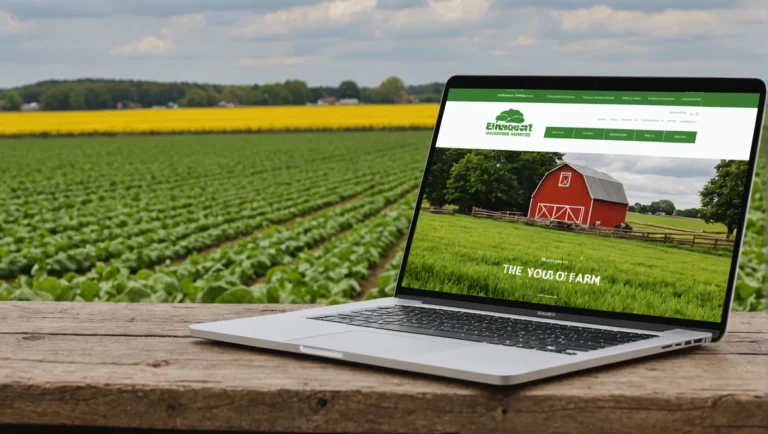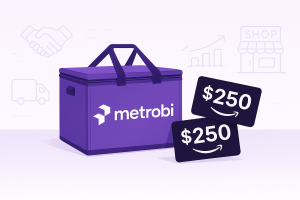Are you a farm business owner looking to expand your reach and boost sales in 2024? Having a well-designed website is crucial for attracting new customers and showcasing your products. Discover vital strategies for selecting the right farmland, ensuring your farm business flourishes online and in the field.
In this comprehensive guide, we’ll walk you through the essential features your farm website needs, provide a step-by-step process for creating your actual farm site using a website builder, and share effective strategies for promoting your new online presence.
Plus, we’ll break down the costs involved in setting up and maintaining your farm website, so you can plan your budget accordingly.
Save 80% of delivery management time
We handle everything:
- Dedicated operations manager
- Real-time tracking dashboard
- Automated customer notifications
- Urgent issue resolution
Effective Strategies for Promoting Your New Farm Website
Leverage email marketing to drive traffic and sales
Building an email list is one of the most effective ways to promote your new farm website and drive sales. Start by placing opt-in forms on your website, and encouraging visitors to subscribe to your newsletter. Offer an incentive, such as a discount code or exclusive content, to entice people to sign up.
Once you have a list of subscribers, send regular newsletters featuring your latest products, promotions, and farm updates. Keep your emails engaging by using compelling subject lines, personalized greetings, and clear calls to action. Encourage subscribers to visit your website by linking to specific product pages or blog posts.
Tips for effective email marketing
-
Segment your email list based on subscriber interests and behaviors
-
Test different subject lines and email formats to optimize open and click-through rates
-
Use automation to send targeted emails based on subscriber actions, such as abandoned cart reminders
-
Monitor your email metrics and adjust your strategy accordingly
Collaborate with local businesses and influencers
Partnering with local businesses and influencers can help increase your website’s visibility and credibility. Reach out to local restaurants, farmefarmers’ets, and food bloggers who share your target audience and values.
Offer to write guest posts for their websites or blogs, showcasing your expertise and linking back to your website. Provide product samples for them to review or feature in their content. Host joint promotions, such as a giveaway or special event, to tap into their audiences and drive traffic to your website.
Benefits of collaborating with local businesses and influencers
-
Gain exposure to new, relevant audiences
-
Build relationships with potential partners and customers
-
Establish your farm as a trusted and reputable brand in your community
-
Generate high-quality backlinks to improve your website’s search engine rankings
Optimize your website for search engines (SEO)
To attract organic traffic from search engines like Google, it’s essential to optimize your website for relevant keywords. Research and discover the terms and phrases your target audience uses when searching for products or services like yours. Incorporate these keywords naturally throughout your website’s content, including page titles, headings, and meta descriptions.
Building high-quality backlinks from reputable websites in your niche can boost search engine rankings. Engage with other farm websites, local farmer directories, and industry publications to secure valuable links. Additionally, hire the best IT experts to ensure the website is technically optimized—mobile responsive, fast-loading, and easy to navigate.
Key elements of SEO for farm websites
-
Keyword research and optimization
-
High-quality, relevant content
-
Backlink building from reputable sources
-
Fast page load speeds and mobile responsiveness
-
Secure HTTPS connection
Engage with your audience on social media
Social media platforms like Facebook, Instagram, and Twitter provide excellent opportunities to promote your new farm website and engage with your audience. Share links to your website’s content, showcase your products and announce promotions to drive traffic and sales.
Interact with your followers by responding to comments and messages promptly. Encourage engagement by asking questions, running polls, and sharing user-generated content. Use relevant hashtags and visuals, such as photos and videos, to increase the reach and appeal of your posts.
Tips for effective social media engagement
-
Choose the platforms where your target audience is most active
-
Post consistently and at optimal times for your audience
-
Use a mix of informative, entertaining, and promotional content
-
Monitor your social media metrics and adjust your strategy based on performance
-
Collaborate with influencers and other brands to expand your reach
Leverage paid advertising to target specific audiences
While organic promotion strategies are essential, paid advertising can help you reach specific audiences and drive targeted traffic to your website. Platforms like Google Ads, Facebook Ads, and Instagram Ads allow you to create ads tailored to your target audience’s interests, behaviors, and demographics.
When creating ads, use compelling visuals and copy that highlight your unique selling points and encourage clicks to your website. Set clear goals for your campaigns, such as driving website traffic, increasing product sales, or growing your email list. Monitor your ad performance regularly and adjust your targeting, budget, and creativity as needed to optimize results.
Benefits of paid advertising for farm websites
-
Reach specific target audiences based on interests, and behaviors, and demo gave targeted traffic to specific pages on your website
-
Control your budget and adjust spending based on performance
-
Gain insights into audience preferences and behaviors through ad platform analytics
-
Complement organic promotion efforts to maximize website visibility and traffic
Metrobi is transforming farm deliveries
Specialized solutions for farm businesses:
- Farm-trained drivers
- Proper handling equipment
- Peak day delivery support
- 23% average cost reduction
Understanding the Costs of Creating a Farm Website
-
Website builders offer affordable subscription plans, ranging from $5 to $50 per month
-
Additional costs include domain registration, e-commerce fees, and optional professional services
-
DIY website builders are a cost-effective solution for most small farm businesses
Creating a website for your farm business is an essential step in establishing your online presence and reaching a wider audience. However, it’s crucial to understand the costs involved in setting up and maintaining a website. In this section, we’ll explore the various expenses associated with creating a farm website, including website design agency subscription fees, domain name registration, e-commerce and payment processing fees, and optional professional design or development services.
Website builder subscription fees
When choosing a website builder for your farm business, you’ll typically encounter monthly or annual subscription plans. These plans vary in price, ranging from as low as $5 per month to around $50 per month, depending on the features and services included.
Most website builders offer a range of plans to cater to different needs and budgets. Basic plans often provide essential features like customizable templates, mobile responsiveness, and limited storage space. Higher-tier plans may include advanced features such as e-commerce functionality, analytics, and priority customer support.
Some website builders also offer free plans, which can be a good starting point for those on a tight budget. However, free plans often come with limitations, such as reduced functionality, limited storage, and the inclusion of the website builder’s branding on your site.
Domain name registration and renewal
In addition to website builder subscription fees, you’ll need to consider the cost of registering and renewing your domain name. A domain name is the unique web address that visitors use to access your website.
Registering a domain name typically costs between $10 and $20 per year, depending on the domain extension (.com, .net, .org, etc.) and the registrar you choose. Some website builders offer free domain registration for the first year as part of their subscription plans, which can help you save on initial costs.
It’s important to note that domain name registration is an ongoing expense. After the initial registration period, you’ll need to renew your domain name annually to maintain ownership and ensure your website remains accessible. Renewal prices may vary depending on the domain extension and registrar, so it’s a good idea to factor this into your long-term website budget.
E-commerce and payment processing fees
If you plan to sell products or services directly through your farm website, for example, you’ll need to consider the additional costs associated with e-commerce functionality and payment processing.
E-commerce plans offered by website builders often have higher subscription costs compared to basic website plans. These plans typically include features like product management, inventory tracking, and secure payment gateways.
When accepting online payments, you’ll also need to account for payment processing fees. Payment processors like PayPal or Stripe charge per-transaction fees, which usually range from 2% to 3% of the transaction amount, plus a small fixed fee.
Additional e-commerce costs to consider
-
Shipping costs: If you plan to ship physical products, you’ll need to factor in the cost of packaging materials and shipping services.
-
Taxes: Depending on your location and the nature of your business, you may be required to collect and remit sales tax on your online transactions.
-
Inventory management tools: As your online sales grow, you may need to invest in inventory management software to help you track stock levels and streamline order fulfillment.
Professional design or development services (optional)
While DIY website builders are a cost-effective solution for most small farm businesses, some owners and farmers may choose to invest in professional design or development services to create a more custom or complex website.
Hiring a professional designer or developer can cost anywhere from $500 to $5,000 or more, depending on the complexity of your website, the features you require, and the level of customization desired.
For most small farm businesses, DIY website builders offer a cost-effective alternative to professional services. These platforms provide a range of customizable templates and drag-and-drop tools, enabling users to create professional-looking farming websites without the need for coding or design skills.
What is a Farm Website?
-
A farm website is your agricultural business’s online home
-
It attracts customers, shares information, and sells products
-
Different types exist, from informational to e-commerce
Definition and purpose
A farm website is an online platform that serves as a digital representation of your agricultural business. It acts as a virtual storefront, information hub, and communication channel all in one. The primary purpose of a farm website is to attract potential customers, engage with them, and ultimately convert them into loyal patrons of your products or services. Explore our comprehensive guide on how to initiate a farming venture, presenting key strategies to kick-start a prosperous agricultural enterprise.
Your farm website is often the first point of contact between your business and potential customers. It provides a 24/7 accessible platform for people to learn about your farm, its history, values, and offerings. A well-designed website can showcase your products, share your story, and build trust with your audience. Just as your website serves to connect and protect your farm’s image, securing insurance for farmers is a key step in safeguarding your operations and investments.
Benefits of having a farm website
Having a farm website offers numerous benefits for your agricultural business. First and foremost, it increases your visibility and reaches a wider audience beyond your local area. With a website, your farm can be discovered by potential customers from anywhere in the world, expanding your market and growth opportunities.
A website also provides a convenient way for customers to learn about and purchase your products. They can browse your offerings, read product descriptions, and make purchases at their own pace, without the constraints of physical store hours. This convenience can lead to increased sales and customer satisfaction.
Moreover, a professional online presence helps build trust, credibility, and brand loyalty. By providing valuable information, showcasing your expertise, and sharing your farm’s story, you can establish a strong connection with your audience. This connection can foster long-term relationships and encourage repeat business.
Types of Actual Farm Websites
There are several types of farm websites, each serving a specific purpose:
-
Informational websites: These websites focus on sharing your farm’s story, mission, and offerings. They provide in-depth information about your agricultural practices, sustainability efforts, and the people behind your business. The goal is to educate and engage visitors, building a strong brand identity.
-
E-commerce websites: These websites allow customers to purchase your products directly online. They feature a product catalog, shopping cart functionality, and secure payment processing. E-commerce websites are ideal for farms looking to expand their sales beyond local markets and offer convenient shopping options for customers. These websites can be your financial assistance about your ecommerce farm business.
-
Hybrid websites: These websites combine informational content with e-commerce functionality. They provide a comprehensive overview of your farm while also allowing customers to make purchases. Hybrid websites offer the best of both worlds, catering to both information-seekers and online shoppers.
-
Membership or subscription-based websites: These websites offer regular deliveries or exclusive content to subscribers. They are popular among farms that offer community-supported agriculture (CSA) programs or monthly subscription boxes with a subscription form. Members can manage their accounts, update preferences, and access exclusive resources through the website.
Examples of successful farming websites, Such as Fair Oaks Farms
To inspire your farm website creation, let’s look at some examples of successful agricultural websites:
-
Stone Barns Center for Food and Agriculture: This informative website is visually appealing and mission-driven. It effectively communicates the center’s commitment to sustainable farming practices and educates visitors about its programs, events, and resources.
-
Polyface Farms: Known for its innovative agricultural practices, Polyface Farms’ website engages visitors with compelling storytelling and transparent information about its farming methods. The site also features an online store where customers can purchase the farm’s products.
-
Full Belly Farm: This user-friendly website showcases the farm’s seasonal offerings, provides regular updates, and allows customers to manage their CSA shares subscriptions. The design is clean and intuitive, making it easy for visitors to find the information they need.
-
Harley Farms Goat Dairy: With its charming branding and engaging content, this website effectively showcases the farm’s goat dairy products and agritourism experiences. Visitors can learn about the farm’s history, meet the goats, and purchase products through the online store.
The importance of authenticity
When creating your farm website, it’s crucial to showcase your unique story and values with modern amenities. Authenticity is key to building trust and connection with your audience. Share the history of your farm, harvest season, the faces behind the operation, and your commitment to sustainable practices. Learn how to initiate a farming venture with our comprehensive guide, outlining all you need to know to get your farm up and running successfully.
Use high-quality images and videos to give visitors a genuine glimpse into life on your farm. Avoid stock photos or generic content that doesn’t reflect your brand. Your website should convey the personality and passion that sets your farm apart.
Integrating social proof
Another effective way to build trust and credibility is through social proof. Incorporate customer testimonials, reviews, or ratings on your farm website. These positive endorsements from satisfied customers can influence potential buyers and demonstrate the quality of your products or services.
You can also showcase any awards, certifications, or media mentions your farm or company has received. These third-party validations further establish your expertise and reputation in the industry.
Your Farm’s Online Success Starts Here
Creating a website for your farm business in 2024 is easier than ever. With the right features, a step-by-step plan, and effective promotion strategies, you can establish a strong online presence that attracts and engages customers.
Investing in a modern, professional website is a smart move for any farm looking to expand its reach and grow its business. While there are costs involved, the benefits of increased visibility, direct sales, and customer loyalty make it a worthwhile investment.
Ready to take your farm online? Start by choosing a reliable website builder, selecting a memorable domain name, and customizing your site with your unique branding and content. Don’t forget to set up an online store and test your site thoroughly before launch.
Once your website is live, promote it through email marketing, collaborations, SEO, and social media engagement. These strategies will drive traffic, generate leads, and ultimately boost your farm and family’s success.
What’s one thing you can do today to start building your farm’s website? Whether it’s researching website builders or brainstorming domain names, take that first step towards creating a powerful online presence for your agricultural land or business.














